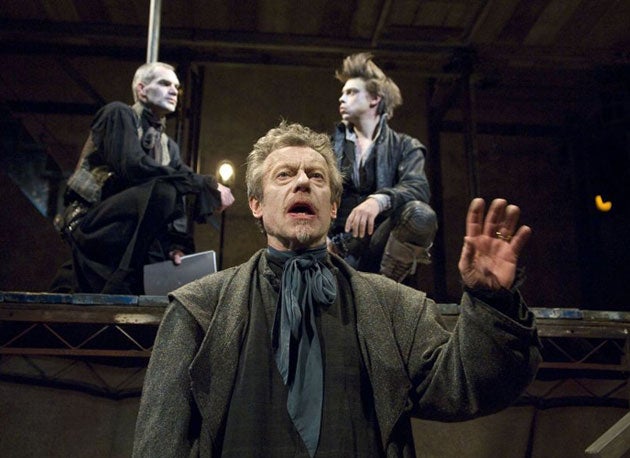The Tragedy of Thomas Hobbes, Wilton's Music Hall, London
Too many scientists spoil the drama

Three years ago, the American playwright and director Adriano Shaplin told Michael Boyd, the RSC's artistic director, in a public debate, that Shakespeare was neither universal nor a genius and that the industry formed in his name was killing the contemporary theatre.
Obviously, therefore, Boyd promptly hired Shaplin as an RSC playwright in residence, and he's spent the last two years "embedded" with the company in Stratford-upon-Avon. The fruits of this unlikely collaboration are displayed in the launch of a new RSC season in the East End, and I'm afraid they're rotten.
The idea is to present an epic contest between philosophy and science during the last days of Cromwell's protectorate, the Restoration of Charles II and the Great Fire, ending with a rejuvenation of the theatre and a performance of Thomas Shadwell's The Virtuoso (a play presented with some brio by the RSC in the early 1990s) in 1676.
The project turns out to coincide with one-time RSC playwright Peter Flannery's new Civil War series on Channel 4, The Devil's Whore, and there are times – aeons, in fact – during this grim trudge through experiments with an air pump, astronomical speculation and declamations on the meridian brain that you long for a bit more cloak and dagger, rough and tumble. How tragic that Flannery has said that, had the television series not happened, he might well have written a Civil War trilogy for the RSC.
Instead, we have the lesser tragedy of Thomas Hobbes, tilting at the windmills of scientific progress while managing to switch loyalties from Cromwell to Charles. Although the play livens up in the second half, and Elizabeth Freestone's production suddenly lurches, somewhat desperately, into a silhouetted ballet of the scientists, poor old Hobbes is left apparently instigating the Great Fire by burning his own pamphlets. Then what? (Hobbes, though banned from publishing in England, lived and wrote until 1679, but this is just one more loose end left flapping in the wind.)
Stephen Boxer plays Hobbes as an avuncular witness to the innovations of the chemist and architect Robert Hooke (Jack Laskey), the pioneering neurologist Thomas Willis (John Paul Connolly) and the astronomer John Wilkins (Keir Charles). Each of these men is probably worth a play of his own, but collectively their dramatic input is like that of a bunch of rude mechanicals without the jokes. Cue a fresh upstart ("Welcome, Mr Newton") to lend the proceedings a superfluous shot of gravity.
The framing relationship in the play, and one that never reverberates, is between the natural philosopher Robert Boyle (incomprehensibly, and tediously, played as a woman by the colourless Amanda Hadingue) and the symbol of the shut-down theatres, the louche actor Rotten (Angus Wright), reduced to prostitution.
Once Newton declares that light is made up of particles while Hooke insists on his theory of waves, the transition is made to the re-opening of the theatres and the performance of The Virtuoso, with the sight of the dotty boffin Gimcrack (a role played in that RSC revival by the gloriously eccentric Freddie Jones) swimming on dry land and dissecting his cock lobsters, a satire to send Hooke screaming into the street.
By this stage you just settle for any sign of animation, really, while muttering quietly to yourself Dryden's derision of Shadwell in Mac Flecknoe: "All arguments, but most his plays, persuade/ That for anointed dullness he was made." As far as Shaplin is concerned, there's far too much Adriano and not enough "Sharlie", if you ask me, and it's no compensation at all that this beautiful venue still resonates with the spirit of vaudeville.
The RSC has built up an elaborately scaffolded new stage and a steeply raised auditorium, an expensive architectural intrusion comparable to their appropriation of the Roundhouse for the histories, but not as convincing as a statement about the creative spirit of the company. Much of the evening – a trial of our strength if not a revelation of the actors' – resembles a jumbled history play for schools television in the bad old days.
To 6 December (0844 800 1118; www.rsc.org.uk)
Join our commenting forum
Join thought-provoking conversations, follow other Independent readers and see their replies
Comments